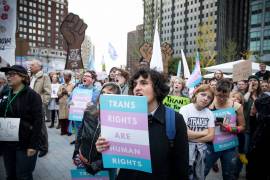
From Impact Magazine: Indiana Was the Tip Of The Iceberg
Blog Search
More than 100 state bills so far have aimed to use religious beliefs as an excuse for discrimination. The idea is to allow businesses and public employees to mistreat LGBT people and consider married same-sex couples as unmarried.
Indiana is paying a public relations firm $2 million to rebrand the state as welcoming to LGBT people. The state hopes to win back business support following the uproar this spring over its “Religious Freedom Restoration Act” (RFRA).
The PR disaster for the pro-RFRA movement is much bigger than Indiana, however. Lambda Legal and our allies have shined a bright light on the discriminatory goals of similar “religious freedom” bills being pressed in state legislatures throughout the country. That targeting is ugly. And the public has taken notice.
Indiana’s bill was introduced as political payback for our movement’s success last year in stopping an anti-marriage bill and then Lambda Legal’s victorious Indiana marriage lawsuit. We can only expect that the June Supreme Court marriage victory will prompt our opponents to go full throttle.
Awareness of these bills began, for many, last year in Arizona. There, a public uproar persuaded then-Governor Jan Brewer to veto a bill designed to allow for-profit businesses to turn away same-sex couples. It would have expanded the state’s already broad “special rights” for religious organizations.
This year, things got more complicated: The outcry against RFRA bills in Indiana—and then in Arkansas—prompted not vetoes but revisions. Indiana Governor Mike Pence rushed to sign the RFRA bill, only to face a national onslaught of criticism. Lambda Legal and other LGBT advocates had offered numerous, carefully crafted amendments aimed at lessening the Indiana bill's damaging effects. But one by one, each was rejected.
Later, Pence and other state leaders grudgingly amended the new law to prevent its expanded religious rights from being used against civil rights laws. But they refused our proposals to include civil rights protections for LGBT people. Arkansas heard similar protests against the outsized RFRA passed onto Governor Asa Hutchinson’s desk. He insisted that it be pared down somewhat, and then he signed it.
Both states now have new RFRA statutes. Despite the constraints that both legislatures eventually accepted, LGBT people, women and others remain terribly vulnerable.
Since Indiana and Arkansas, Lambda Legal has seen the same basic fight play out state by state, with mixed results.
Lambda Legal advocated strongly against a Florida bill to allow child welfare agencies to bar LGBT people from fostering children based on religious objections. That bill has been stalled. And heroic eff orts in Texas managed to block more than a dozen anti-LGBT bills.
But North Carolina legislators overturned Governor Pat McCrory’s veto of a bill to allow public employees to refuse marriage licenses and solemnizations for same-sex couples. And Michigan Governor Rick Snyder signed a package of bills allowing religiously affiliated adoption agencies to discriminate on religious grounds against prospective parents—with taxpayer funds. In Louisiana, the legislature had stood firm for fairness and the state’s tourism industry, but Governor Bobby Jindal issued a defiant executive order elevating religious rights over equality in the marketplace.
After last year’s U.S. Supreme Court ruling in Hobby Lobby, many in Congress are viewing this blizzard of state bills with alarm. They are rethinking not just the 20-year-old federal RFRA but also the lack of clear federal protections for LGBT people and women’s reproductive autonomy.
Enacted back in 1993, the federal RFRA has little in common with the new state versions. President Clinton signed it into law to keep government from infringing on individuals’ right to exercise their religions in traditional ways and places. In contrast, the new state RFRA bills take ideas from Hobby Lobby’s gross expansion of the federal RFRA. They are intended to allow businesses and government employees to discriminate against LGBT people.
This is a major turning point in our movement. Opponents of equality have failed in their attempts to keep us from being allowed to marry. Now their strategy is to recast the meaning of religious liberty. But Lambda Legal knows the difference between protecting the freedom of a church or a member of the clergy and allowing a grocery store to choose its customers.
Lambda Legal has powerful assets in this discussion. As litigators, we bring unique voices to policy-making. Take Amy Sandler, our client in the Indiana marriage lawsuit, who testified at the Indiana RFRA bill hearing this spring. She told the story of her late wife Niki’s last days, quoting Niki as saying, “This is not an issue of religion. This is an issue of equality and one of freedom.”
There wasn’t a dry eye in the room after Amy spoke. But too many legislators were unmoved. It was clearer than ever to those watching the hearing around the state and country: The lawmakers’ main goal was to make sure Indiana businesses could discriminate against gay people.
What’s perhaps less understood is how many areas of life are coming under assault from these anti-LGBT “religious exemption” bills. Some are RFRA variants, while others aim to allow refusals related to children’s services, health care, student groups or government benefits, such as public contracts or grants. Still others hope to restrict transgender people’s public restroom access based on chromosomes or birth certificates.
This is a front-burner problem for our community. In more than half of the states, LGBT people still do not have basic civil rights protections. In such states, RFRA bills aim to preemptively make religious beliefs an excuse to discriminate.
It’s time to enact comprehensive, explicit protections for LGBT people nationwide and to amend existing RFRAs to ensure that religious freedom remains strong without causing harm to other people.
Lambda Legal expects our opponents to continue pushing for exemptions every time we call for equality. But we know the RFRA terrain: Each bill deserves close attention—and skepticism. If a proposed law says “religious liberty” on the box, we say, “Look inside.”
What’s Hobby Lobby?
In 2014, the U.S. Supreme Court ruled that religiously minded business owners can refuse to subsidize birth control coverage in their employees’ health plans, shifting the cost to insurers. The ruling directly addressed reproductive freedom, but there is also widespread concern about prioritizing religious interests generally over equality in the workplace. The Justices may have left the door open for discrimination against LGBT people as well.




